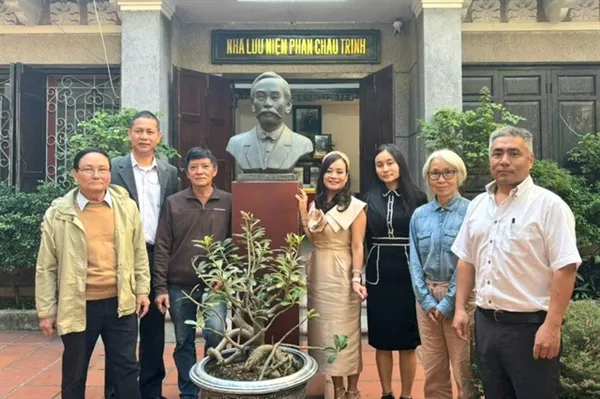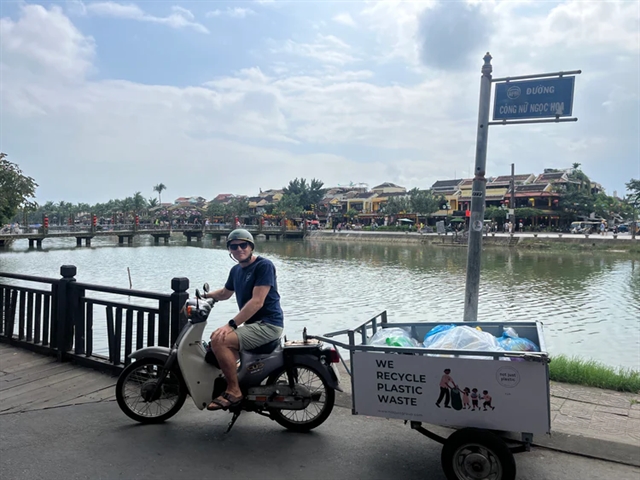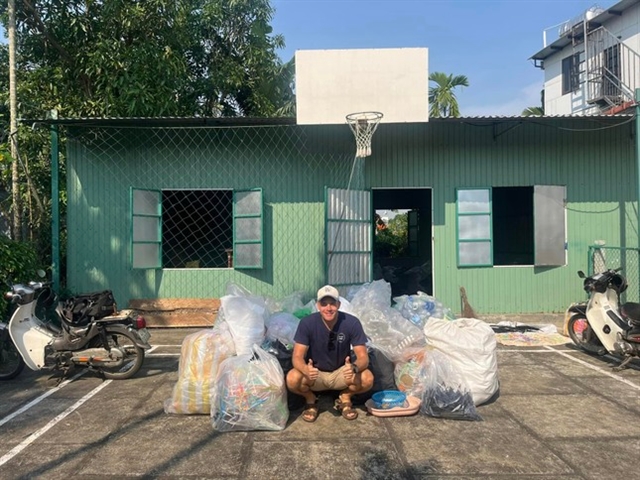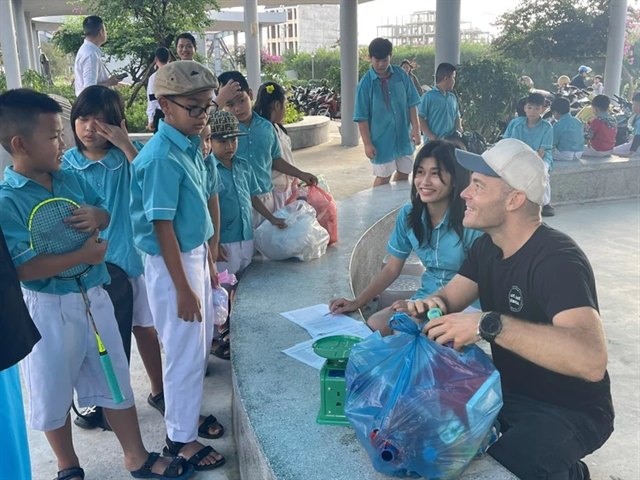 Expat Corner
Expat Corner

 |
| Frantz Pedersen drives his motorbike-drawn cart to collect plastic waste in Hội An for recycling. His start-up project has collected ten tonnes of plastic waste for recycling since 2022. — Photo courtesy of Kinh Quốc |
HỘI AN — Entrepreneur Frantz Pedersen was inspired with a simple bamboo-made bottle.
It all began in the ancient town of Hội An in 2015 with him creating a sustainable and biodegradable product.
Frantz then decided to set up his own company, ‘Not Just Bamboo’, and after two and half years of testing and studying, he began production of environment-friendly one-piece bamboo bottles.
He then started recycling various other materials including coffee grounds and paper waste, aiming to make biodegradable cups as part of his series of environment-friendly products.
In early 2022, the Dane successfully introduced a natural material-based cup from mixture of coffee grounds, bamboo pieces and paper waste, along with a bio adhesive material, for sale into the European market.
 |
| Frantz Pedersen collects plastic bags from restaurants and cafe shops in Hôi An and Đà Nẵng to upcycle into useable products. He began environment-friendly recycling with bamboo in Hội An in 2015 before expanding into plastic recycling. — Photo courtesy of Kinh Quốc |
Frantz then expanded the production with his project ‘Not Just Plastic’, a cooperation with the Not Just Group Việt Nam Company, collecting plastic from restaurants, cafes and schools in Hội An and Đà Nẵng City.
“Plastic is divided into seven types, but we just focus on high value plastic bottles made from PET (Polyethylene terephthalate) and HDPE (High-density polyethylene). It’s because low-value plastic including plastic bags and single-use plastic cups and straws are difficult to recycle,” Frantz said.
“We often collect plastic waste from around a hundred restaurants, cafes, hotels, and schools to recycle into new useable products,” he said.
The Dane said he faced challenges with local household waste as almost families do not sort their waste at source, so classification for production was hard.
He recalled that he spent more than a year trying to instruct and educate the local community and restaurant owners on the importance of waste classification at source for easy cleaning.
"We took time to work on rubbish classification with restaurants and café owners, school managers and the community on how to reduce plastic waste. I eventually persuaded them set down plastic waste classification in the bins. It is then easy for families to bring already sorted plastic to our recycling facility or our company members could come to collect," Frantz recalled.
He drives his cart to collect plastic waste at restaurants, shops and cafes in Hội An on Mondays, Wednesdays and Fridays.
To date, Frantz’s company has collected more than ten tonnes of plastic waste for recycling and the recycling business received positive support from local communities in Hội An and Đà Nẵng.
 |
| Frantz Pedersen shares experience in sorting out plastic waste for recycling with school students in Hội An. — Photo courtesy of Kinh Quốc |
He said he found people here very friendly and helpful.
“People always help each other, especially in Hội An. That’s what I love in Việt Nam. The people in Đà Nẵng and Hội An are very open."
The expat also developed a charity project ‘Give Back to Việt Nam’ by donating some of the profits from recycled products to schools and NGOs in Việt Nam.
The project has contributed to building 12 water filter systems and a solar power system in the northern mountainous province of Lào Cai, providing safe drinking water for about 3,000 school students.
Frantz has also been producing plastic floor tiles made from 85 per cent recycled materials, including HDPE and timber debris.
Frantz said he continues to inspire change in Việt Nam, not just by selling recycled products but telling stories of recycled items and sustainable development. — VNS




